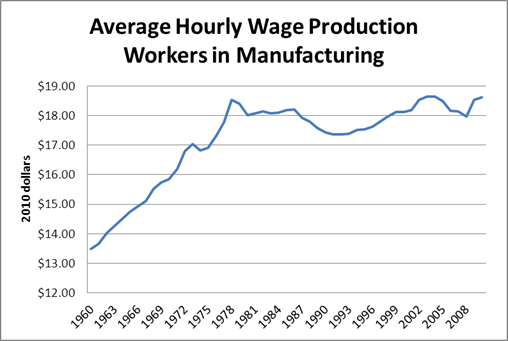Article • Dean Baker’s Beat the Press
Fact-based, data-driven research and analysis to advance democratic debate on vital issues shaping people’s lives.
Center for Economic and Policy Research
1611 Connecticut Ave. NW
Suite 400
Washington, DC 20009
Tel: 202-293-5380
Fax: 202-588-1356
https://cepr.net
Charles Murray is back in the Wall Street Journal rejecting the idea that poor economic prospects had anything to do with the fact that so many whites without college degrees dropped out of the labor force. There are a few points that are worth noting about this story.
First Murray does a bizarre comparison by looking at real wages between 1960 and 2010. This is bizarre because wages rose rapidly through the sixties and into the early seventies, then largely stagnated. (I am using manufacturing workers to pick a typical job held by non-college educated white makes.)

Bureau of Labor Statistics.
Note that there is some increase in real wages in the late 90s, the first period of sustained low unemployment since the late 60s. Interestingly, these wage gains coincided with the first period of sustained low unemployment since early 70s. Also, if we look at the graph that Murray has with his article we see that the labor force participation for whites with just a high school degree actually rose slightly in this period, reversing the long-term trend. That might suggest that labor market conditions are a big part of this story.
There are two other points worth considering in this story. First, the share of white males with just a high school degree (i.e. no college or even vocational training) has fallen sharply over this period. In other words, whites with just a high school degree are a smaller and relatively less educated segment of the white work force today than was the case 40 years ago.
The other point is that we might think that relative income means something. In a thirty year period where per capita income more than doubled, we might expect that workers would have at least something to show. The fact that the wages of white males with just high school degrees has barely budged in three decades indicates that their situation has deteriorated seriously in relative terms.